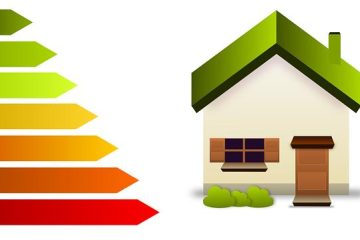Table of Contents
- Understanding Energy Efficiency Programs in Massachusetts
- Key Strategies for Improving Home Energy Efficiency
- Incentives and Rebates for Energy-efficient Upgrades
- The Role of Renewable Energy in Massachusetts Energy Goals
- Community Initiatives Promoting Energy Conservation
- Q&A
- In Conclusion
Understanding Energy Efficiency Programs in Massachusetts
Energy efficiency programs in Massachusetts are designed to reduce energy consumption while providing cost savings and environmental benefits. Funded primarily through utility companies, these initiatives aim to help residents and businesses adopt more efficient technologies and practices. By participating, consumers can access rebates, incentives, and comprehensive energy audits that identify opportunities for energy conservation in their homes and workplaces.
Some significant features of these programs include:
- Home Energy Assessments: These assessments help homeowners pinpoint where energy is being wasted, allowing them to make informed decisions about improvements.
- Rebates and Incentives: Many eligible upgrades, such as energy-efficient appliances, insulation, and heating systems, come with rebates that offset the initial investment.
- Targeted Outreach: Specific programs are designed for low-income households, ensuring that all residents can benefit from energy savings.
Statistics show that participating in these programs not only lowers utility bills but also contributes to a significant reduction in greenhouse gas emissions. A recent study revealed that energy efficiency initiatives in Massachusetts have saved consumers billions of dollars over the years while reducing reliance on fossil fuels. For those looking to further understand these programs, the state offers a wealth of resources, including online portals and local energy offices, where individuals can learn about eligibility and application processes.


Key Strategies for Improving Home Energy Efficiency
Maximizing your home’s energy efficiency starts with assessing and upgrading various components. One effective strategy is to conduct a thorough energy audit. This process identifies areas where energy is wasted, such as inadequate insulation or drafty windows. By pinpointing these issues, homeowners can prioritize upgrades that will produce the greatest impact. Consider these essential upgrades:
- Insulation improvement: Upgrading insulation in your attic, walls, and floors can significantly reduce heating and cooling costs.
- Window replacement: Opt for energy-efficient windows that help maintain indoor temperatures.
- Duct sealing: Ensure that heating and cooling ducts are properly sealed to prevent leaks.
Another crucial approach involves the adoption of energy-efficient appliances. Appliances account for a considerable portion of household energy consumption, so choosing Energy Star-rated models can lead to substantial savings. When replacing older appliances, focus on those with lower energy usage, which can help mitigate utility bills. Look for:
- High-efficiency HVAC systems: Investing in modern heating and cooling systems can improve your energy consumption.
- Smart thermostats: These devices allow for optimal temperature control and scheduling, reducing energy waste.
- Energy-efficient water heaters: Consider tankless or solar water heaters for lower energy use.
Lastly, implementing renewable energy sources can significantly bolster energy efficiency. Massachusetts homeowners can benefit from state incentives for installing solar panels or small wind turbines, thus reducing reliance on non-renewable energy sources. Additionally, consider collaborating with local utility programs that promote energy conservation initiatives. The following table summarizes potential energy-saving incentives:
| Incentive Type | Description |
|---|---|
| Solar Incentives | Tax credits and rebates for solar panel installations |
| Mass Save Program | Offers rebates for energy-efficient home upgrades |
| Net Metering | Readily credits homeowners for excess energy generated |


Incentives and Rebates for Energy-efficient Upgrades
One of the most compelling reasons to consider energy-efficient upgrades in Massachusetts is the wide array of incentives and rebates available to homeowners and businesses. These programs are designed not only to encourage the adoption of green technologies but also to alleviate the financial burden of upgrading your energy systems. By taking advantage of these incentives, you can significantly reduce your upfront costs, making it easier to transition to a more sustainable and cost-effective energy solution.
Common types of incentives include:
- Mass Save® Program: Offers insulation rebates and energy assessments to help reduce energy waste.
- Federal Tax Credits: Federal incentives for solar panel installations and other renewable technologies.
- Local Utility Programs: Various rebates and incentives from local utility providers to promote energy-efficient appliances and upgrades.
To give you a clearer picture, here’s a simple table summarizing some of the key programs available:
| Program Name | Type of Incentive | Eligible Upgrades |
|---|---|---|
| Mass Save | Rebates | Insulation, Heating Systems, Cooling Systems |
| Federal Tax Credit | Tax Deduction | Solar Panels, Geothermal Heat Pumps |
| Local Utility Rebates | Rebates | Energy-Efficient Appliances |
These programs not only make energy-efficient upgrades more affordable but also contribute to Massachusetts’ broader goals of reducing greenhouse gas emissions and promoting sustainable practices. By participating, you are investing in both your property and the planet, making a responsible decision that benefits both your wallet and the environment.


The Role of Renewable Energy in Massachusetts Energy Goals
Massachusetts is at the forefront of the renewable energy revolution, leveraging its natural resources to achieve its ambitious energy efficiency goals. The state’s commitment to harnessing wind, solar, and hydroelectric power plays a crucial role in transitioning from fossil fuels to sustainable energy sources. This shift not only helps to reduce greenhouse gas emissions but also positions Massachusetts as a leader in clean energy innovation. As a result, local communities benefit from improved air quality and reduced dependence on imported fossil fuels.
Key initiatives in the state have catalyzed the growth of renewable energy, making it an integral part of Massachusetts’ energy landscape. The Massachusetts Clean Energy Standard aims to ensure that a significant portion of electricity comes from renewable sources. To that end, the state has introduced various programs and incentives, such as:
- Solar Massachusetts Renewable Target (SMART) Program
- Offshore Wind Industry Development
- Energy Storage Initiative
- Renewable Portfolio Standard (RPS)
These initiatives foster investment in renewable projects and facilitate job creation in the clean energy sector. They also encourage innovation by providing financial support for R&D in renewable technologies. The following table highlights the state’s renewable energy sources and their contributions to the overall energy mix:
| Energy Source | Percentage of Total Renewable Generation |
|---|---|
| Solar Energy | 20% |
| Wind Energy | 22% |
| Hydropower | 15% |
| Biomass | 8% |
| Other Sources | 35% |
This concerted effort not only highlights Massachusetts’ dedication to sustainability, but it also exemplifies how a state can effectively integrate renewable energy into its broader energy efficiency strategy, paving the way for a cleaner and more resilient future.


Community Initiatives Promoting Energy Conservation
Across the state, numerous initiatives are making waves in the journey towards energy efficiency. Local governments and organizations are collaborating to create programs aimed at engaging communities in reducing energy consumption. One such program is the Residential Energy Efficiency Program, which helps homeowners conduct energy audits and obtain rebates for implementing energy-saving upgrades. Additionally, local workshops and seminars are organized to educate residents about the benefits and strategies of energy conservation.
Community gardens have also embraced eco-friendly practices by incorporating solar-powered tools and systems that highlight the importance of renewable energy sources. Schools and educational institutions are integrating energy conservation into their curricula, fostering a culture of sustainability among the youth. Initiatives like these not only promote energy efficiency but also empower community members to become active participants in preserving the environment. Events such as Energy Awareness Month provide platforms for individuals to share their conservation success stories and learn from one another.
| Community Initiative | Description |
|---|---|
| Home Energy Audits | Free assessments to identify energy-saving opportunities. |
| Solar Workshops | Hands-on sessions teaching solar panel installation and benefits. |
| School Programs | Curricular activities focusing on sustainability and energy conservation. |
| Rebate Incentives | Financial incentives for energy-efficient upgrades like appliances and insulation. |
Q&A
Q&A: Energy Efficiency in Massachusetts
Q1: What is energy efficiency, and why is it important in Massachusetts?
A1: Energy efficiency refers to using less energy to provide the same service or achieve the same outcomes. In Massachusetts, focusing on energy efficiency is crucial because it helps reduce greenhouse gas emissions, lowers energy costs for residents and businesses, and supports the state’s commitment to sustainability and environmental protection. A more energy-efficient Massachusetts not only conserves resources but also improves the overall economy and public health.Q2: What programs are available in Massachusetts to promote energy efficiency?
A2: Massachusetts offers a variety of programs aimed at promoting energy efficiency through the Massachusetts Energy Efficiency Program. These initiatives include incentives for home energy assessments, rebates for energy-efficient appliances, and funding for weatherization projects. Organizations like Mass Save play a significant role in providing resources and assistance to homeowners and businesses seeking to improve their energy efficiency.Q3: How can I reduce my home energy consumption in Massachusetts?
A3: There are several effective strategies to lower your energy consumption at home, including:- Conducting a Home Energy Assessment: Utilize free assessments offered by Mass Save to identify areas where your home can become more efficient.
- Upgrading Insulation and Sealing Air Leaks: Ensuring your home is properly insulated can significantly reduce heating and cooling costs.
- Investing in Energy-Efficient Appliances: Look for ENERGY STAR® certified products when replacing old appliances.
- Adopting Smart Energy Habits: Simple changes, like using LED light bulbs, unplugging devices when not in use, and utilizing programmable thermostats, can lead to substantial savings.




0 Comments